A majority of U.S. adults ages 50 and older who don’t have children say not having kids hasn’t had much of an impact on their personal relationships. And for the most part, they report that they rarely, if ever, felt pressure to have children when they were younger. Similarly, majorities of adults under 50 who say they are unlikely to have children say they rarely, if ever, talk about having kids with family or friends.
The impact of not having children on relationships
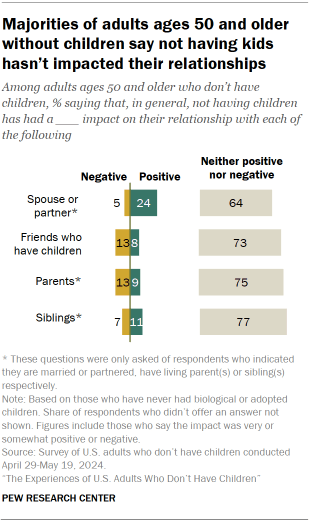
Among adults ages 50 and older, large shares say not having children has had neither a positive nor a negative impact on their relationships with their spouse or partner (64%), their friends who have children (73%), their parents (75%), and their siblings (77%).2
About a quarter of married or partnered adults without children (24%) say not having kids has had a positive impact on their relationship with their spouse or partner. This is larger than the shares who see a positive impact on the other relationships we asked about.
Those ages 50 and older who never wanted to have children are especially likely to say not having kids has had a positive impact on their relationship with their spouse or partner. Some 36% say this, compared with 17% of those who say they wanted to have children at some point, and 23% of those who say they weren’t sure if they wanted children.
Pressure to have children
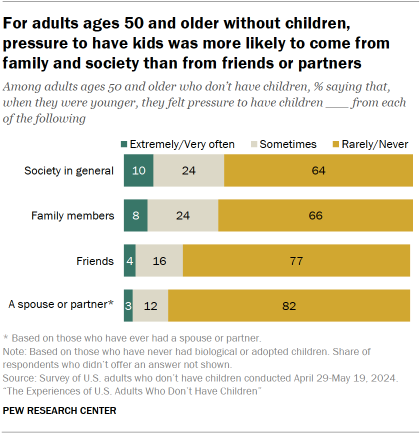
Majorities of adults ages 50 and older who don’t have children also report that they rarely or never felt pressure to have kids from a spouse or partner, friends, family, or society.3
Still, about a third say they felt pressure to have children at least sometimes from:
- Society in general (34%)
- Family members (32%)
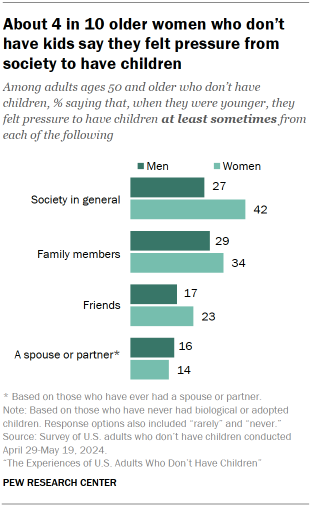
Smaller shares say they felt pressured at least sometimes by:
- Friends (20%)
- A spouse or partner (15%)
Among adults ages 50 and older who don’t have children, women are especially likely to say they felt pressure from society to have children. About four-in-ten (42%) say they felt this pressure at least sometimes, compared with 27% of men.
Similarly, women are more likely than men to say they faced pressure from family or friends. There are no gender differences when it comes to pressure from a spouse or partner (among those who have ever had a spouse or partner).
Relationships with nieces and nephews
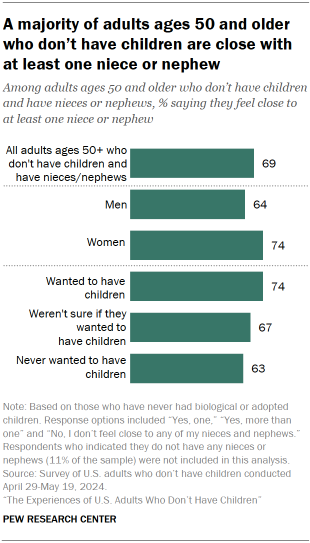
Adults ages 50 and older who don’t have children often have close relationships with family members in younger generations.
Among those 50 and older who don’t have children but do have nieces or nephews, 69% say they feel close with at least one niece or nephew. Only 11% of adults in this age group who don’t have children indicate that they don’t have any nieces or nephews.
Women are more likely than men to say they are close with at least one niece or nephew (74% vs. 64%). Still, large shares of both groups say this.
Among adults 50 and older who don’t have children and say they wanted to at some point, 74% report they’re close with at least one niece or nephew. This is larger than the shares of those who weren’t sure if they wanted to have kids (67%) and those who never wanted to have kids (63%).
Providing care for aging parents
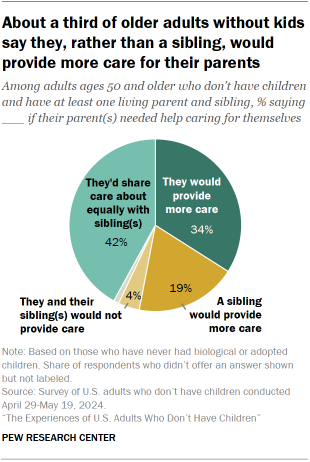
We also asked adults ages 50 and older who don’t have children about providing care for their own parents. Specifically, we asked those with one or more siblings and at least one living parent who would provide more care if their parent needed it.
- 34% say they would provide more of the care.
- 42% say they would share caregiving responsibilities about equally with siblings.
- 19% say a sibling would provide more of the care.
Women are more likely than men to say they would provide more care than their siblings (40% vs. 30%).
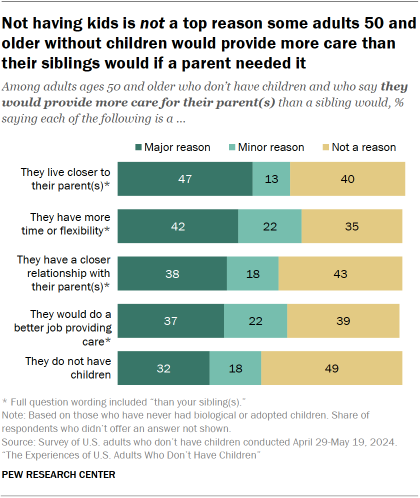
When we asked those who said they would provide more care than their siblings about why that might be, not having children didn’t stand out as a top reason.
Adults without children are more likely to say living closer to their parents is a major reason they would provide more of the care than to say it’s because they don’t have kids.
There are no other statistically significant differences in the reasons adults who don’t have children say they would take on more of the care. They are equally likely to point to things like having more time or flexibility or being able to do a better job than their siblings as they are to say it’s because they don’t have kids.
How often younger adults talk about having children
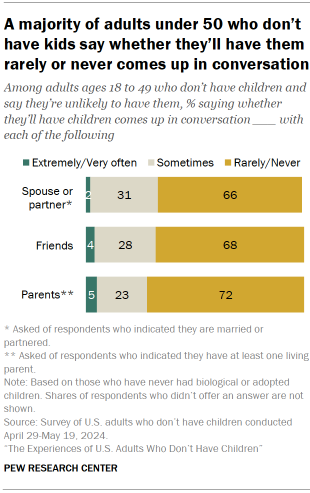
We asked adults under 50 who don’t have children and say they’re unlikely to have them about how often the subject of having kids comes up in conversations with family and friends.
A majority say whether they’ll have children rarely or never comes up in conversation with their spouse or partner (among those who are married or in a committed relationship), their friends, or their parents (among those with a living parent).
Still, about a third of these adults say the topic comes up at least sometimes with their spouse or partner (34%) and their friends (32%).4 About three-in-ten (28%) say it comes up at least sometimes with their parents.
Differences by gender
Among adults under 50 who don’t have children and say they’re unlikely to ever have them, women are more likely than men to say whether they’ll have children comes up at least sometimes in conversations with their friends (41% vs. 26%). There are no significant gender differences in shares saying it comes up in conversations with their spouse or partner or with their parents.
Differences by age
Among those who are married or partnered, adults under 40 are twice as likely as those ages 4o to 49 to say whether they’ll have children comes up at least sometimes with their spouse or partner (40% vs. 20%).
Similarly, 37% of those under 40 say the topic comes up at least sometimes with their friends, compared with 20% of those 40 to 49.
Friends and children
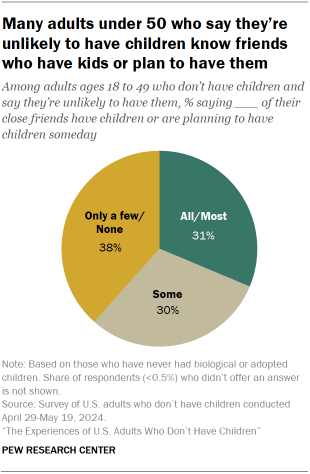
About four-in-ten adults under 50 who don’t have children and say they are unlikely to have them (38%) say only a few or none of their close friends have children or are planning to have them one day.
Similar shares say all or most (31%) or some of their friends (30%) have children or are planning to have them.
Those under 40 are more likely than those ages 40 to 49 to say only a few or none of their friends have children or are planning to (44% vs. 23%).
The impact of not having children on dating
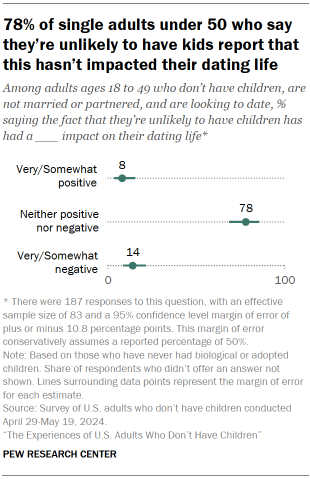
We asked adults under 50 who don’t have children and are not in a committed relationship about their dating life, if they indicated they are looking to date.
About eight-in-ten of these adults (78%) say the fact that they’re unlikely to have children has had neither a positive nor a negative impact on their dating life.
There is no statistical difference between the shares saying it’s had a positive (8%) or a negative impact (14%) on their dating life.




